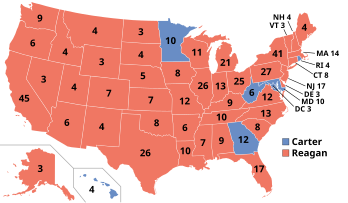
Back انتخابات الرئاسة الأمريكية 1980 Arabic Президентски избори в САЩ (1980) Bulgarian Volby prezidenta USA 1980 Czech Præsidentvalget i USA 1980 Danish Präsidentschaftswahl in den Vereinigten Staaten 1980 German Προεδρική εκλογή των Ηνωμένων Πολιτειών 1980 Greek Elecciones presidenciales de Estados Unidos de 1980 Spanish انتخابات ریاستجمهوری ایالات متحده آمریکا (۱۹۸۰) FA Yhdysvaltain presidentinvaalit 1980 Finnish Élection présidentielle américaine de 1980 French
| |||||||||||||||||||||||||||||||||||||
538 members of the Electoral College 270 electoral votes needed to win | |||||||||||||||||||||||||||||||||||||
|---|---|---|---|---|---|---|---|---|---|---|---|---|---|---|---|---|---|---|---|---|---|---|---|---|---|---|---|---|---|---|---|---|---|---|---|---|---|
| Turnout | 54.2%[1] | ||||||||||||||||||||||||||||||||||||
| |||||||||||||||||||||||||||||||||||||
 Presidential election results map. Red denotes states won by Reagan/Bush and blue denotes those won by Carter/Mondale. Numbers indicate electoral votes cast by each state. | |||||||||||||||||||||||||||||||||||||
| |||||||||||||||||||||||||||||||||||||
The 1980 United States presidential election was the 49th quadrennial presidential election, held on November 4, 1980. The Republican nominee, former California governor Ronald Reagan, defeated incumbent Democratic President Jimmy Carter in a landslide victory.
Carter's unpopularity and poor relations with Democratic leaders encouraged an unsuccessful intra-party challenge from Massachusetts Senator Ted Kennedy. Meanwhile, the Republican primaries were contested between former California Governor Ronald Reagan, former Central Intelligence Agency director George H. W. Bush, Illinois Representative John B. Anderson, and several other candidates. All of Reagan's opponents had dropped out by the end of the primaries, and the Republicans nominated a ticket consisting of Reagan and Bush. Anderson entered the general election as an independent candidate with Patrick Lucey, former Wisconsin governor, as his running mate.
Reagan campaigned for increased defense spending, supply-side economic policies, and a balanced budget. His campaign was aided by Democratic dissatisfaction with Carter, the Iran hostage crisis, and a worsening economy marred by stagflation. Carter attacked Reagan as a dangerous right-wing extremist, and warned that Reagan would cut Medicare and Social Security. The Carter campaign was aided early on by the rally 'round the flag effect from the hostage crisis, but as the crisis lasted to election day, it became a detriment.[2]
Reagan won the election in a landslide, with 489 Electoral College votes to Carter's 49 and 50.8% of the popular vote to Carter's 41.0%. Anderson won 6.6% of the popular vote and no electoral votes. Due to the rise of conservatism following Reagan's victory, historians have considered the election a political realignment that began with Barry Goldwater's presidential campaign in 1964. To date, this is the most recent election in which an incumbent Democratic president was not reelected and the only time that a Republican nominee defeated a Democratic incumbent in both the popular and the electoral vote.[3]
- ^ "National General Election VEP Turnout Rates, 1789-Present". United States Election Project. CQ Press.
- ^ Callaghan, Karen J.; Virtanen, Simo (August 1993). "Revised Models of the "Rally Phenomenon": The Case of the Carter Presidency". The Journal of Politics. 55 (3): 756–764. doi:10.2307/2131999. ISSN 0022-3816.
- ^ Perlstein, Richard (2001). Before the Storm: Barry Goldwater and the Unmaking of the American Consensus. New York: Nation Books. pp. x. ISBN 978-1-56858-412-6.
Cite error: There are <ref group=lower-alpha> tags or {{efn}} templates on this page, but the references will not show without a {{reflist|group=lower-alpha}} template or {{notelist}} template (see the help page).


